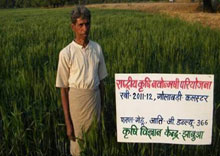 Increase in agricultural production through crop diversification and related technologies enhanced opportunities for rural livelihoods in tribal district Jhabua, Madhya Pradesh. Seed is the most basic, critical and vital input for the sustainability in growth of agricultural production. The scarcity of quality seed, its timely unavailability, non-availability of quality seed of adopted varieties, high seed price and role of the middle-man in seed distribution were the challenges before tribal farmers in process of seed availability of adopted improved varieties. The NAIP scientists of KVK, Jhabua implemented the concept of seed societies in order to accelerate the availability of quality seed in tribal areas. The scientists worked to build the capacity of community members and made an effort to develop administrative and legal processes. After discussing the proposal, interested farmers voted unanimously to set up seed societies namely, Laxami Beej Utpadak Shakari Sanstha Maryadit, Golabadi and Sharda Beej Utpadak Shakari Sanstha Maryadit, Narsingrunda (Rotla) having 22 and 21 farmers members, respectively. Further, two seed societies namely, Ashapuri beej Utpadak Shakari Sanstha Maryadit, Jhyada and Balram Beej Utpadak Shakari Sanstha Maryadit, Vaglawat were also created with a total of 21 members in individual society. NAIP scientists regularly arranged trainings on the formation and management of societies, seed production technologies, seed standards and also highlighted their benefits. Now, the members of seed societies are performing the activities of seed production, processing, and storage as well as for seed quality assurance. They are marketing the seed produced to both farmers in the community and beyond. The training is facilitating in input supply, quality control, institutional and marketing supports etc.
Increase in agricultural production through crop diversification and related technologies enhanced opportunities for rural livelihoods in tribal district Jhabua, Madhya Pradesh. Seed is the most basic, critical and vital input for the sustainability in growth of agricultural production. The scarcity of quality seed, its timely unavailability, non-availability of quality seed of adopted varieties, high seed price and role of the middle-man in seed distribution were the challenges before tribal farmers in process of seed availability of adopted improved varieties. The NAIP scientists of KVK, Jhabua implemented the concept of seed societies in order to accelerate the availability of quality seed in tribal areas. The scientists worked to build the capacity of community members and made an effort to develop administrative and legal processes. After discussing the proposal, interested farmers voted unanimously to set up seed societies namely, Laxami Beej Utpadak Shakari Sanstha Maryadit, Golabadi and Sharda Beej Utpadak Shakari Sanstha Maryadit, Narsingrunda (Rotla) having 22 and 21 farmers members, respectively. Further, two seed societies namely, Ashapuri beej Utpadak Shakari Sanstha Maryadit, Jhyada and Balram Beej Utpadak Shakari Sanstha Maryadit, Vaglawat were also created with a total of 21 members in individual society. NAIP scientists regularly arranged trainings on the formation and management of societies, seed production technologies, seed standards and also highlighted their benefits. Now, the members of seed societies are performing the activities of seed production, processing, and storage as well as for seed quality assurance. They are marketing the seed produced to both farmers in the community and beyond. The training is facilitating in input supply, quality control, institutional and marketing supports etc.
The ripple effects of these societies are clearly visible. Farmers are getting good prices for their crops. High quality seeds are available to them at right time and place. Seed production facilities are strengthening in the area. With increased profit margins, they have become entrepreneurs in seed system and exploring the technical aspects of the market. These societies have produced around 307.2 tonnes of quality seeds in last two years from a sown area of 6223ha in six crops. The crops and varieties involved in seed production were soybean [JS 96-60, JS 93-05 and JS 335], maize [KH 612 and JVM 421], pigeonpea [ JA 4 and JKM 189], black gram [JU 8-6], wheat [ JW 3020, MP 4010, GW 322, GW 366, GW 273 and HI 1418] and gram [ JG 218, JG 11, JG 16 and JG 130]. The quantity of seed produced was 72.2 tonnes in soybean, 61.0 tonnes in maize, 3.0 tonnes in pigeonpea, 3.1 tonnes in black gram, 115.7 tonnes in wheat and 52.2 tonnes in gram a short spell of time.
In the last two years, the societies registered under NAIP project have generated business worth of Rs. 63.87 lakhs. On an average, farmers are getting a profit of Rs 33034/ha/year from production and marketing of quality seeds. The observed profit was maximum in gram (Rs. 38986/ha/year), followed by wheat (Rs. 30351/ha/year), soybean (Rs. 30777/ha/year) and maize (Rs. 14321/ha/year) while, it was noted minimum in black gram (Rs. 12677/ha/year) and pigeonpea (Rs. 10385/ha/year). These societies are facilitating identification of suitable superior crops and their improved varieties for sustainable production enhancement in rainfed and undulating areas of Jhabua agro-climatic conditions. The assured availability of quality seed of improved crop varieties in remote hilly areas is accelerating the seed replacement rate and promoting the fast adoption of new technologies thus, supporting the horizontal and vertical expansion of agricultural system for sustainable livelihood security.
Influenced by the success of these four societies, farmers in neighbouring villages and districts are being inspired to do the same. Presently, 21 seed societies in Dhar district are offering services to tribal farmers. Thus, the seed societies are increasing the cropping intensity, boosting the crop productivity, promoting socio-economic development, strengthening the seed infrastructure in remote areas and sparkling happiness on the face of tribal farmers.
(Source: Director Research and NAIP team, Rajmata Vijayaraje Scindia Krishi Vishwa Vidyalaya, Gwalior)







फेसबुक पर लाइक करें
यूट्यूब पर सदस्यता लें
X पर फॉलो करना X
इंस्टाग्राम पर लाइक करें